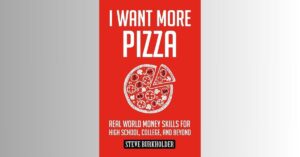Debt can have negative consequences on our finances if we borrow irresponsibly or don’t manage it well. Therefore, it’s important that your autistic teen to understand what debt is, how it can impact their finances and how to use it correctly. That includes learning about credit and how to build it the right way.
As a reminder, we are using the book ““I Want More Pizza: Real World Money Skills For High School, College, And Beyond” (affiliate link) by Steve Burkholder for these lessons. Steve is a certified public accountant and has worked in the finance department in higher education. He has a passion for teaching teens and young adults about personal finance, and I found his book a few years ago when looking for a good resource for J, my son with autism and ADHD, to learn about money.

Lesson #6: Understanding Debt
Read the “4th Slice” (pages 65-76) of “I Want More Pizza” (affiliate link) with your teenager. I found it is best to let your teen read it on their own before the lesson. You can read it aloud together, but you may want to break it up into two sessions.
Debt takeaways to share with your autistic teen
- Debt is when you borrow money from a bank, family member, friend or any other organization or person. It is also referred to as a loan or credit.
- Debt comes with two risks:
- The first is that you have pay interest on the amount of money borrowed as you pay it back.
- The second is that you risk overspending, or spending above your means. (Meaning you consistently spend more money than you have in cash. This is generally called living beyond your means.)
- Too many people make bad decisions with debt, especially credit cards.
- Credit cards can be a convenient way to pay for stuff and track your expenses, however, you have to pay the full balance every month. If you are responsible with a credit card that has a low balance limit, it can be a good way to build credit.
- Paying for stuff with a credit card and then not paying the full balance due each month can be a financial disaster for many people. That is because the interest on credit cards is very high! (Steve provides a great real-world example on page 69 – be sure to study the chart.) Paying only the minimum due each month leads to your debt building and paying potentially thousands dollars more in interest payments.
- Debt can be good if you have a mortgage to pay for a home. At reasonable amounts and interest rates, student loans can be helpful in paying for a college education. (Although you should try for as many scholarships and other types of financial assistance before resorting to student loans. Even then, using savings and having a part-time job to cover as much as the cost as possible is preferable!)
Debt and credit discussion tips with your autistic teen
- Talk about how to use a credit card responsibly. Ask your teen how they could manage their credit card usage to avoid building up debt.
- Discuss the risks of debt and why it’s best to avoid it as much as they can by saving up for purchases and looking for other ways to pay for something (e.g., scholarships for college instead of a student loan).
- If your teen is planning for college, make a plan to search and apply for scholarships on a regular basis during their junior and senior years. Did you know there are college scholarships specifically for students with autism? The CollegScholarships.org website is a good place to start. Also, some autism grants also aid with college costs. Be sure to research local scholarship opportunities as well.
Practical Money Activity
Use this credit card payoff calculator from Bankrate to find out how long it would take to eliminate different credit card balances.







